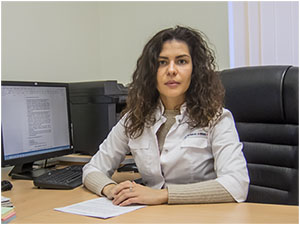- Biobanking
- Cell technologies
- About the Department of biomedical technologies and the cell technologies laboratory
BIOBANKING
Currently, cryogenic technology is gaining more and more relevance, in which human body's own biological tissues and cells are taken and then preserved for a long time, for their possible subsequent use as a therapeutic, preventive or rehabilitative tool.
You can save your biomaterial today, when you are healthy and full of energy, for use in 5, 10 or even 20 years' time.
WHO MIGHT BE INTERESTED IN CRYOPRESERVATION?
- Healthy people who are actively involved in sports or occupational activities with an increased risk of injuries;
- Healthy people working under high stress conditions - "emotional burnout syndrome";
- People at risk of developing oncological diseases;
- Patients - the possibility of using both adipose tissue itself and cell products derived from it in the treatment and rehabilitation of various diseases.
CELL TECHNOLOGIES
Adipose tissue has a high potential for regenerative medicine. It is possible to extract a unique mixture of cells from the adipose tissue with a wide range of effects for the treatment of a large number of diseases.
WHY EXACTLY THE ADIPOSE TISSUE?
- Adipose tissue is a rich source of active regenerative cells available in every human being;
- Virtually painless aesthetic biomaterial sampling procedure in a day-care facility;
- If the patient wishes, it is possible to combine "pleasant with useful": a complete aesthetic liposuction to remove fat deposits from problematic areas, and to preserve biomaterial, which previously had to be disposed of;
- Immediate use of cells with high regenerative potential when treatment is required;
- With advances in medical science, pre-prepared adipose tissue cells will become an indispensable basis for innovative therapies for diseases of various etiologies.
In addition to the high regenerative potential of adipose tissue cells, the adipose tissue is a versatile natural material for replenishing soft tissue defects in the correction of breast shape (both for aesthetic purposes and after surgery), for correcting facial shapes, and for compensating for soft tissue defects resulting from injuries.
The use of regenerative cells has become firmly established in the arsenal of modern approaches to the treatment of a range of hereditary and acquired diseases. The medicines currently used in healthcare can only help to support the diseased organ and cope with its function. Whereas the regenerative cells restore the structure and function of the diseased organ or tissue, the use of such cells is becoming more relevant than ever.
Adipose tissue cells with high regenerative potential can be used for:
- Injuries and degenerative changes of the musculoskeletal system;
- All types of burns;
- Diseases of the genitourinary system;
- Diseases of the visual organs;
- Chronic liver and kidney diseases;
- Systemic diseases;
- Allopecia;
- To improve the treatment results of complex surgical operations.
ABOUT THE DEPARTMENT OF BIOMEDICAL TECHNOLOGIES AND THE CELL TECHNOLOGIES LABORATORY

|
GILMUTDINOVA ILMIRA RINATOVNA Head of the Department of Biomedical Technologies and the Cell Technologies Laboratory, PhD (Medicine) Transfusiologist, dermato-venereologist, cell technologies specialist |
DEPARTMENT STRUCTURE
• Cell technologies laboratory
• Laboratory of experimental medicine
The department is equipped with state-of-the-art equipment necessary for scientific and applied work on the isolation, cultivation of human and animal cells and the creation of new advanced methods of treatment and rehabilitation using cell technologies.
MAIN ACTIVITIES OF THE DEPARTMENT:
Scientific activity
- Development and testing of innovative methods of personalised medicine based on cell technologies
- Development of innovative treatment and rehabilitation technologies with their further transfer to practical healthcare
- Providing services in the area of biocompatibility and possible cytotoxic effect of materials in vitro and in vivo
Clinical services
- Cryopreservation and cryopreservation of tissues and cells for a long period of time
- Services for obtaining regenerative cells from a patient's adipose tissue.

